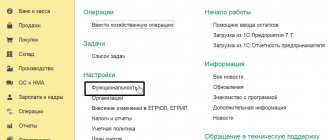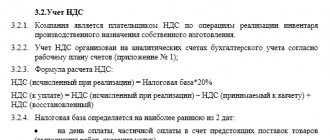Home — Documents
Organizations registered this year and wishing to use a simplified taxation system from the beginning of their business activities, like all other organizations already applying this special tax regime, in accordance with Art. 2 of the Federal Law of December 6, 2011 N 402-FZ “On Accounting” are required to keep accounting records in full. Before Law No. 402-FZ came into force, simplified organizations were required to keep accounting records only of fixed assets and intangible assets (Clause 3, Article 4 of Federal Law No. 129-FZ of November 21, 1996 “On Accounting”).
The reason for this exception was that, according to Art. 346.12 of the Tax Code of the Russian Federation did not have the right to apply a simplified taxation system for organizations for which, in particular, the residual value of fixed assets and intangible assets, determined in accordance with the legislation of the Russian Federation on accounting, exceeds 100,000,000 rubles. If before January 1 of this year, the “simplified” people were still asking the question about the need to draw up an accounting policy, now all doubts on this matter have disappeared. The set of ways an economic entity maintains accounting records constitutes its accounting policy. An economic entity independently forms its accounting policy, guided by the legislation of the Russian Federation on accounting, federal and industry standards (clauses 1 and 2 of Article 8 of Law No. 402-FZ). The basis for the formation of accounting policies for accounting purposes is contained in the Accounting Regulations “Accounting Policy of the Organization” (PBU 1/2008) (approved by Order of the Ministry of Finance of Russia dated October 6, 2008 N 106n). PBU 1/2008 provides a more expanded definition of the organization's accounting policies. This is understood as the set of accounting methods adopted by the organization - primary observation, cost measurement, current grouping and final generalization of the facts of economic activity (clause 2). The choice of one of the options for accounting methods for specific transactions proposed by regulatory documents, independent development of accounting methods and justification for deviations from the requirements of regulatory documents constitute the accounting policy of the organization.
Since to calculate the tax paid when using the simplified tax system with the object “income reduced by the amount of expenses”, the norms of Chapter. 25 “Organizational Income Tax” of the Tax Code of the Russian Federation, which, in turn, also provide for accounting options, then the simplified tax accounting policy of organizations with the specified object is also necessary.
Most often, the simplified taxation system is used by organizations with a small accounting staff (mostly only the chief accountant), so these organizations have a natural desire to simplify and bring together accounting and tax accounting as much as possible. Unfortunately, this is not always possible. Although for small businesses, including “simplified” ones, there are more opportunities, since they may not apply a number of accounting provisions, and they also have special provisions for the application of certain norms from individual PBUs, which make it possible to bring accounting and tax accounting closer together. (The criteria for classifying an organization as a small business are given in Article 4 of the Federal Law of July 24, 2007 N 209-FZ “On the development of small and medium-sized businesses in the Russian Federation.”)
Therefore, the accounting policy of the “simplified” person should begin with a list of regulations on the basis of which he will conduct his accounting. In addition to the aforementioned Law N 402-FZ, it should include the following regulations:
- Regulations on maintaining accounting and financial statements in the Russian Federation (approved by Order of the Ministry of Finance of Russia dated July 29, 1998 N 34n);
- Chart of accounts for financial and economic activities of organizations and Instructions for its application (approved by Order of the Ministry of Finance of Russia dated October 31, 2000 N 94n);
- list of accounting standards that will be used in accounting;
- Information of the Ministry of Finance of Russia N PZ-3/2012 “On a simplified system of accounting and financial reporting for small businesses”;
- methodological instructions and recommendations issued by the Ministry of Finance of Russia and other ministries and departments necessary in the work of the organization (this phrase can simply be transferred to the accounting policy without listing the instructions and recommendations).
Naturally, if both accounting and tax accounting policies are combined in one order, then the main tax document - the Tax Code of the Russian Federation - should also be indicated.
The accounting policy also specifies the persons responsible for organizing and maintaining accounting records. These are:
- manager - for organizing accounting, compliance with the law when performing business transactions and storing accounting documents (Article 7 of Law No. 402-FZ);
- chief accountant - for maintaining accounting records (Article 7 of Law No. 402-FZ) and developing accounting policies (clause 4 of PBU 1/2008).
We remind you that according to clause 3 of Art. 7 of Law N 402-FZ, an agreement on accounting can be concluded with an organization or specialist, and in small and medium-sized enterprises the manager can keep records independently. This should be taken into account when assigning responsibilities.
Paragraph 4 of PBU 1/2008 stipulates that, along with the selected accounting methods, the following are approved:
- a working chart of accounts containing synthetic and analytical accounts necessary for maintaining accounting records in accordance with the requirements of timeliness and completeness of accounting and reporting;
- forms of primary accounting documents, accounting registers, as well as documents for internal accounting reporting;
- the procedure for conducting an inventory of the organization’s assets and liabilities;
- methods for assessing assets and liabilities;
- document flow rules and accounting information processing technology;
- the procedure for monitoring business operations;
- other solutions necessary for organizing accounting.
The accounting policy should approve all primary documents used by the organization (clause 4, article 9 of Law N 402-FZ). This applies both to unified forms of primary documents approved by the resolutions of the State Statistics Committee of Russia, and to those independently developed. After all, unified forms of primary documents are no longer mandatory for use.
“Simplified” should also consolidate in the accounting policy the choice of option for accounting reporting forms, because Order of the Ministry of Finance of Russia dated July 2, 2010 N 66n for small businesses provides the right to choose between:
- common reporting forms;
- simplified general forms;
- forms intended only for small businesses.
From our point of view, for “simplified” people who have a small amount of accounting, it is preferable to use forms intended for small businesses.
Another mandatory element of accounting policy is the fixation of the selected object of taxation - “income” or “income reduced by the amount of expenses”.
In the next section “Methodology for maintaining accounting and tax records” of the accounting policy, you should list the accounting elements that the “simplified” will apply.
Accounting registers
Since 2013, the forms of accounting registers have been approved by the head of an economic entity on the recommendation of the official responsible for maintaining accounting records (clause 5 of Article 10 of Law No. 402-FZ).
Registers are selected in accordance with the chosen form of accounting:
- if accounting is kept using a computer program, then the registers provided in this program are used (the most common option);
- With a journal-order accounting system, journals-orders are used;
- with the memorial system, memorial orders are used;
- with a simplified accounting system for small enterprises - a book of business transactions without using (simple form) or using property accounting registers (given in Appendices No. 1 - No. 11 to the Standard Recommendations for organizing accounting for small businesses, approved by Order of the Ministry of Finance of Russia dated December 21, 1998 N 64n).
Article 346.24 of the Tax Code of the Russian Federation provides for only one version of the tax accounting register - this is the Book of Income and Expenses of organizations and individual entrepreneurs using a simplified taxation system (approved by Order of the Ministry of Finance of Russia dated October 22, 2012 N 135n). At the same time, clause 1.4 of the Procedure for filling out the income accounting book provides for the possibility of maintaining it both on paper and in electronic form. It is this choice that should be consolidated in the accounting policy.
Is accounting policy necessary for the simplified tax system?
Organizations must draw up an accounting policy both for accounting purposes (since 2013 they are required to keep accounting in full according to Article 6, 32 of the Law of December 6, 2011 No. 402-FZ), and for the purpose of calculating tax under the simplified tax system.
Accounting policies can be drawn up:
But individual entrepreneurs (IP) only need a tax accounting policy. After all, they are exempt from accounting under clause 1, part 2, art. 6 of the Law of December 6, 2011 No. 402-FZ; Art. 346.24 Tax Code of the Russian Federation; Letters of the Ministry of Finance dated July 26, 2012 No. 03-11-11/221, dated August 8, 2012 No. 03-11-11/233.
The accounting policy is approved once when creating an organization or registering an individual entrepreneur. And then, if necessary, it is either supplemented (at any time) or changed.
Each organization or individual entrepreneur draws up an accounting policy based on the characteristics of its activities. However, there are general rules that apply to everyone. For example, everyone needs to reflect organizational and technical issues in the accounting policy: establish who signs the primary documents, prescribe the procedure and timing of the inventory, record which forms of primary documents are still used, unified (approved by the State Statistics Committee) or independently developed.
Further we will talk about accounting policies only for tax purposes . And when drawing up an accounting policy for accounting purposes, you can use the accounting policy designer posted on the website of the Glavnaya Ledger publishing house . Select one of the proposed accounting options, and then simply print the finished document.
Methods of accounting for income and expenses
Most organizations take into account income and expenses in their accounting on an accrual basis (Section IV of the Accounting Regulations “Income of the organization” (PBU 9/99) and “Expenses of the organization” (PBU 10/99), approved by Orders of the Ministry of Finance of Russia dated 05/06/1999 N 32n and N 33n respectively).
But there is an exception to this rule. Paragraph 9 clause 12 PBU 9/99, para. 2 clause 18 PBU 10/99 and sec. The 4 mentioned Model Recommendations allow small businesses to keep records of income and expenses using the cash method. Features of accounting under the cash method of accounting are explained in the Standard Recommendations.
For the purposes of calculating tax according to the simplified tax system ch. 26.2 of the Tax Code of the Russian Federation (Article 346.17) stipulates that “simplers” keep records of income and expenses only on a cash basis.
As you can see, regulatory legal documents allow the “simplified” to use the cash method in both accounting. However, such a choice will not reduce the accountant's work. The fact is that in some cases there are more differences between accounting using the same method than when using different methods of accounting for income and expenses.
So, for example, in accounting using the cash method, material expenses are recognized subject to their payment and write-off as expenses, and in tax accounting using the cash method, only the fact of payment is sufficient for their recognition.
Accounting policy on the simplified tax system “Income” for accounting
The policy contains two main blocks - accounting and tax. It is allowed to draw up two separate documents. Accounting in the simplified mode is simpler than in the general mode, since simplified ones are small enterprises, to draw up the UE they need to take into account the following:
1. Indicate the regulations that guide you when drawing up your accounting policies.
2. Develop your own working chart of accounts. A working chart is a stripped-down version of an accounting chart of accounts: it excludes accounts that you will not use. You can add your own subaccounts.
3. Approve the forms of primary and internal documents. The use of unified forms is allowed.
4. Indicate the method of accounting - manually, using software or outsourcing.
5. If desired, instead of invoices, invoices, and certificates of services rendered, use a universal transfer document (UDD), indicate this in the policy.
Keep records of exports and imports in the Kontur.Accounting web service. Simple accounting, payroll and reporting in one service.
Get free access for 14 days
6. Indicate the position of the employee who is responsible for record keeping.
7. For small businesses, it is allowed to choose the method of determining income and expenses - cash or accrual. Under the cash method, income and expenses are recognized when the money is spent. For example, a company shipped goods on May 25, but received payment only on June 25. Revenue will be recognized on June 25th.
Under the accrual method, income and expenses are recognized when they are recorded. The date the money was spent or received does not matter. That is, in the example above, under the accrual method, income will be recognized on May 25.
The cash method is very limited even for small businesses—it cannot be used by companies with quarterly revenue of more than 1 million rubles excluding VAT, credit and microfinance organizations, and so on. Medium and most small organizations have no choice - they are left with only the accrual method.
8. Choose how to recognize rental income - as main income or income from other activities.
Establish methods for accounting and writing off goods, administrative expenses, finished products, fixed assets, inventories, depreciation, and so on. These are general points that are the same for simplifiers and general mode companies. You can read about this in the article Accounting policies for accounting purposes.
Important! If an individual entrepreneur decides to conduct accounting, then he is obliged to draw up an accounting policy.
Accounting for low-cost assets that meet the criteria for fixed assets
It is necessary to determine how low-cost assets will be accounted for - as part of inventories or fixed assets, as well as this “boundary” cost (clause 5 of the Accounting Regulations “Accounting for Fixed Assets” (PBU 6/01), approved by Order of the Ministry of Finance of Russia dated March 30, 2001 N 26n).
It is better to choose as the “boundary” value the minimum cost of fixed assets specified in clause 1 of Art. 256 of the Tax Code of the Russian Federation, - 40,000 rubles. (it is also now proposed in clause 5 of PBU 6/01). In this case, accounting for inventories will be the same for both accounting and simplified taxation.
Why is an organization's accounting policy needed?
Accounting policy is a set of rules, regulations and forms for maintaining accounting and tax records at an enterprise.
Companies have the right to establish for themselves any convenient accounting and reporting registers, but they must not contradict Russian legislation.
Small companies usually develop one simplified accounting policy that covers absolutely all levels of accounting. Medium and large companies with large gross revenues, joint-stock companies, draw up separate documents for accounting and tax purposes that comply with the “Accounting Law” 402-FZ, PBU and the Tax Code of the Russian Federation. The company must submit these documents to the Federal Tax Service simultaneously with the submission of the financial report for the past year.
The company's general director accepts and approves the policy; the chief accountant is usually responsible for development and implementation. The organization's accounting policy for 2021 must be adopted in 2021 by special order of the manager.
Read more about how to correctly draw up an order approving the accounting policies of an LLC and examples of how to fill them out in 2021 here.
Free application with accounting policy templates
Accounting policy
The accounting policy of an LLC for 2021 must necessarily contain:
A complete list of regulatory documents that guide the accounting department of an enterprise - Law 402-FZ On Accounting, PBU, Tax Code of the Russian Federation;
Working chart of accounts for LLC. It is more convenient to develop it as a separate application;
List of accounting forms for accounting and tax purposes. These can be either registers independently developed by the company, or generally accepted, unified ones;
Regulations on the company's fixed assets (with an assessment of their value, the procedure for its recalculation and inventory). If the enterprise has a lot of property, it is also better to take it into account as an appendix to the LLC’s accounting policy;
Standards for accounting of inventory items, finished products, goods;
The procedure for accounting for expenses and income;
Methods for detecting and correcting errors in accounting and tax accounting and criteria for classifying them;
Other materials, forms and registers that the organization considers important for accounting.
Tax accounting policy
The tax part of the organization’s accounting policy in 2021 is developed taking into account the fact that it differs for all companies and is required to display the following information:
Information about the applied taxation system. In the case of several regimes - rules for maintaining separate records;
Depreciation of fixed assets and intangible assets
Clause 18 of PBU 6/01 provides for the following methods of calculating depreciation on fixed assets:
- linear method;
- reducing balance method;
- method of writing off value by the sum of the numbers of years of useful life;
- method of writing off cost in proportion to the volume of products (works).
To calculate depreciation of intangible assets, clause 28 of the Accounting Regulations “Accounting for Intangible Assets” (PBU 14/2007) (approved by Order of the Ministry of Finance of Russia dated December 27, 2007 N 153n), the following methods are provided: linear method, reducing balance method, write-off method proportional to the volume of products (works).
For the purposes of calculating tax according to the simplified tax system ch. 26.2 of the Tax Code of the Russian Federation does not provide alternatives in accounting for expenses for the acquisition (construction, production) of fixed assets, for their completion, additional equipment, reconstruction, modernization and technical re-equipment, for the acquisition (creation by the taxpayer himself) of intangible assets. Such expenses are recognized in accordance with clause 3 of Art. 346.16 Tax Code of the Russian Federation.
A decision should be made to revaluate fixed assets and intangible assets or to abandon it in accounting (clause 15 of PBU 6/01, clause 16 of PBU 14/2007).
Accounting policy for LLC on the simplified tax system for 2021 (sample)
If the new accounting policy affects the final accounting indicators, it is enough to reflect the changes in the indicators in the reporting year. It is not necessary to recalculate accounting indicators for the previous two years. Companies that are not small businesses are required to recalculate indicators as if changes in accounting policies had occurred not since the reporting year, but since the year before (clauses 14, 15 of PBU 1/2008).
Taking into account the above principles, it was compiled:
- sample accounting policy for a small enterprise using the simplified tax system for 2017;
- as well as a sample accounting policy for 2021 for a micro-enterprise.
Method of writing off raw materials and supplies
Clause 16 of the Accounting Regulations “Accounting for Inventories” PBU 5/01 (approved by Order of the Ministry of Finance of Russia dated 06/09/2001 N 44n) provides for the following valuation options when releasing inventories into production and otherwise disposing of them:
- at the cost of each unit;
- average cost;
- the cost of the first acquisition of inventories (FIFO method).
For the purposes of calculating tax according to the simplified tax system, material expenses are taken to reduce income received in the manner prescribed for calculating corporate income tax, Art. 254 of the Tax Code of the Russian Federation (clause 2 of Article 346.16 of the Tax Code of the Russian Federation). Paragraph 8 of this article provides for the following assessment methods when writing off raw materials and supplies used in the production (manufacturing) of goods (performance of work, provision of services):
- by cost per unit of inventory;
- average cost;
- cost of first acquisitions (FIFO);
- cost of recent acquisitions (LIFO).
Costs for delivery of goods
Clauses 6 and 13 of PBU 5/01 provide for options for accounting for costs for the procurement and delivery of goods to the organization’s warehouse:
- their inclusion in the cost of goods (account 41 “Goods”);
- accounting for them as part of sales expenses (account 44 “Sales expenses”) and writing them off in proportion to the sale of goods.
For the purposes of calculating tax under the simplified tax system , expenses directly related to the sale of goods, including costs of storage, maintenance and transportation, are taken into account as expenses after their actual payment (clause 2, clause 2, article 346.17 of the Tax Code of the Russian Federation). Accounting for these expenses does not depend on accounting for goods.
But even if the “simplifier” chooses the same option in both accounts (not including these expenses in the cost of the goods), it will not be possible to minimize the accountant’s work. Indeed, in accounting, the costs of procuring and delivering goods should be distributed between goods sold and those remaining in the warehouse.
Accounting for interest on debt obligations
The accounting regulations “Accounting for expenses on loans and credits” (PBU 15/2008) (approved by Order of the Ministry of Finance of Russia dated October 6, 2008 N 107n) provide a choice only to small businesses. According to clause 7 of PBU 15/2008, small enterprises have the right to choose to recognize all borrowing costs as other expenses or other expenses, with the exception of that part of them that is subject to inclusion in the cost of the investment asset.
For the purposes of calculating tax according to the simplified tax system ch. 26.2 of the Tax Code of the Russian Federation provides for the possibility of accounting for interest paid for the provision of funds (credits, borrowings) for use (clause 9, clause 1, Article 346.16 of the Tax Code of the Russian Federation). Such interest in accordance with clause 2 of Art. 346.16 of the Tax Code of the Russian Federation are taken into account in the manner prescribed for calculating corporate income tax, Art. 269 of the Tax Code of the Russian Federation. By virtue of this norm, interest expenses are accepted for accounting within the calculated limit. There are two ways to calculate it:
- within 20% of the average level of interest paid on debt obligations issued in the same quarter on comparable terms. Debt obligations issued on comparable terms mean debt obligations issued in the same currency for the same terms in comparable amounts, against similar collateral;
- within the limits of the refinancing rate of the Bank of Russia, increased by 1.8 times - when issuing a debt obligation in rubles and a coefficient of 0.8 - for debt obligations in foreign currency.
Other accounting policies
These include:
- the procedure for accepting inventories for accounting in accounting. The chart of accounts provides two options: according to the actual cost of their acquisition (procurement) on account 10 “Materials” or at accounting prices (the possibility of using additional accounts 15 “Procurement and acquisition of material assets” and 16 “Deviation in the cost of material assets”). In tax accounting - only at actual cost;
- the procedure for creating a reserve for doubtful debts in accounting (clause 70 of the Regulations on accounting and financial reporting);
- procedure for correcting significant errors in accounting. It is necessary to determine which errors will be considered significant. Small businesses have the right to choose a method for correcting them: in the general procedure provided for by the Accounting Regulations “Correction of Errors in Accounting and Reporting” (PBU 22/2010) (approved by Order of the Ministry of Finance of Russia dated June 28, 2010 N 63n), or in the order established for minor errors, that is, in correspondence with account 91 “Other income and expenses” and without retrospective recalculation (i.e. prospectively) (clause 9 of PBU 22/2010).
Organizations using the simplified tax system and UTII also need to develop a procedure for separate accounting of income and expenses under these special tax regimes. If it is impossible to divide, distribute in proportion to the shares of income in the total amount of income received when applying the specified special tax regimes (clause 8 of Article 346.18 of the Tax Code of the Russian Federation).
The given list of accounting policy elements is not exhaustive. Each organization must take into account the nuances of its activities and provide for the procedure for taking them into account in its accounting policies.
Do I need to approve accounting policies every year?
Thus, the regulatory documents listed in the previous section containing the requirements for accounting policies do not contain any mention of the mandatory annual approval of the management program. There is also no direct prohibition on this.
What should I do? The decision remains with the company itself. Only she has the right to establish and consolidate the procedure for annual (or other frequency) approval of the UP.
However, when making such a decision, you need to consider the following:
- If the accounting policy does not change from period to period, it is reasonable to apply the principle of rationality - instead of the annual approval of the accounting policy, during its initial registration, indicate the date from which the specified document is subject to application (instead of indicating the next year).
- Make all changes and additions to the UP without re-affirming the entire current UP, i.e. adding them when changing the accounting method - from the beginning of the year, with amendments to the legislation - from the moment they enter into force.
In some cases, the need for frequent approval of the UP may arise, for example, if:
- Constantly at different points of the CP, multiple insignificant nuances are adjusted, which are formalized in separate additions to the CP - in such conditions it is difficult to fully understand the impact of these adjustments as a whole on the content of the accounting policy, and therefore there is a need to approve a new edition of the CP;
- the accounting methods used have radically influenced the type and composition of the current UP - here the approved accounting policy is replaced by adjustments and loses its purpose, therefore it is advisable to approve a new edition of the UP taking into account all the amendments in a single text.
The materials posted on our website will help with the registration of the UE:
The need for annual approval of accounting policies is determined by the management of the company. The law does not contain any requirements or prohibitions in this regard.







